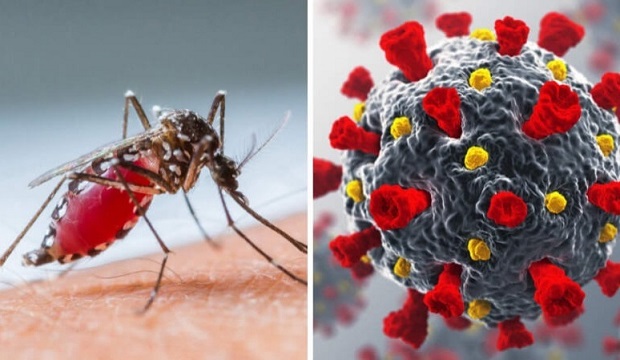Nikhil Prasad Fact checked by:Thailand Medical News Team Oct 29, 2025 3 months, 2 weeks, 1 day, 23 hours, 19 minutes ago
Medical News: How COVID Altered the Body’s Response to Dengue
Scientists from Brazil’s Fundação Oswaldo Cruz (Fiocruz), the Hospital dos Plantadores de Cana, the Rede Casa Hospital Rio Laranjeiras e Rio Botafogo, and the Universidade Federal do Estado do Rio de Janeiro have made an intriguing discovery. They found that people infected with dengue after recovering from COVID-19 show very different blood clotting patterns compared to dengue patients before the pandemic. Their findings reveal that COVID-19 exposure may have altered how the body manages bleeding and blood clotting when faced with dengue fever.
 COVID-19 Changed the Way Dengue Affects Blood Clotting
COVID-19 Changed the Way Dengue Affects Blood Clotting
According to this
Medical News report, both dengue and COVID-19 disturb the body’s hemostasis—the system that keeps blood flowing smoothly while stopping bleeding when needed. Dengue usually increases bleeding risks, while COVID-19 triggers excessive clotting. To see how prior exposure to SARS-CoV-2 might influence dengue infections, the researchers compared blood samples from dengue patients before and after the pandemic.
How the Study Was Conducted
The study analyzed 85 participants divided into three groups: dengue patients from before the pandemic, dengue patients after COVID-19 exposure, and healthy volunteers. The researchers measured levels of substances involved in blood clotting and fibrinolysis, including tissue factor (TF), antithrombin, plasminogen, Factor XIII, and nitric oxide (NO). They also tested how blood plasma from these patients affected platelets—the cells responsible for forming clots—in laboratory experiments.
Key Differences Between Pre and Post COVID Dengue
Before the pandemic, dengue patients showed more frequent bleeding symptoms. After the pandemic, those infected with SARS-CoV-2 or vaccinated against it had fewer bleeding issues but showed a higher presence of nitric oxide—a chemical that widens blood vessels and influences clotting. Interestingly, the post-COVID dengue group also had higher levels of tissue factor, a protein that triggers clot formation, while Factor XIII—needed for stabilizing clots—was lower than before the pandemic.
In contrast, antithrombin (which prevents clots) and plasminogen (which helps dissolve them) were higher in dengue patients before COVID-19. This suggests that dengue infections in the pre-pandemic era had a stronger tendency toward bleeding, while those after COVID exposure leaned toward a more clot-prone state.
What These Findings Mean
This shift in blood behavior indicates that prior COVID-19 infection or vaccination could be reshaping immune and clotting responses during dengue infections. The researchers propose that SARS-CoV-2 may have left behind long-term changes in blood vessels and immune cells, affecting how the body reacts to other viral infections. The increased nitric oxide in post-COVID dengue patients—especially those without bleeding—might reflect an adaptive change where th
e body compensates to maintain balance in blood flow and clotting.
The Role of Platelets and Immune Memory
The laboratory tests showed that platelets exposed to plasma from dengue patients, both before and after COVID-19, produced less nitric oxide compared to dengue virus exposure alone. This suggests that something in the plasma—possibly antibodies from prior infections—modifies how platelets respond. Such immune “memory” could make future viral infections behave differently, even years later.
A New Era for Dengue in a Post COVID World
The study’s authors emphasize that dengue, already a major threat in tropical regions, might behave differently in populations heavily exposed to COVID-19. This could complicate diagnosis, as both diseases share similar early symptoms such as fever and muscle pain. Moreover, standard dengue treatments that focus on preventing bleeding may need to be adjusted if newer dengue cases lean toward clotting tendencies.
The researchers call for more studies to understand these interactions, particularly in countries like Brazil, Thailand, and India, where both dengue and COVID-19 are common. Monitoring markers such as tissue factor, nitric oxide, and Factor XIII could help doctors predict which patients are at risk of bleeding or clotting complications.
The study findings were published in the peer reviewed journal: Viruses.
https://www.mdpi.com/1999-4915/17/11/1431
For the latest on Dengue, keep on logging to Thailand
Medical News.
Read Also:
https://www.thailandmedical.news/articles/dengue-news
https://www.thailandmedical.news/articles/coronavirus
